 Petzlover
Petzlover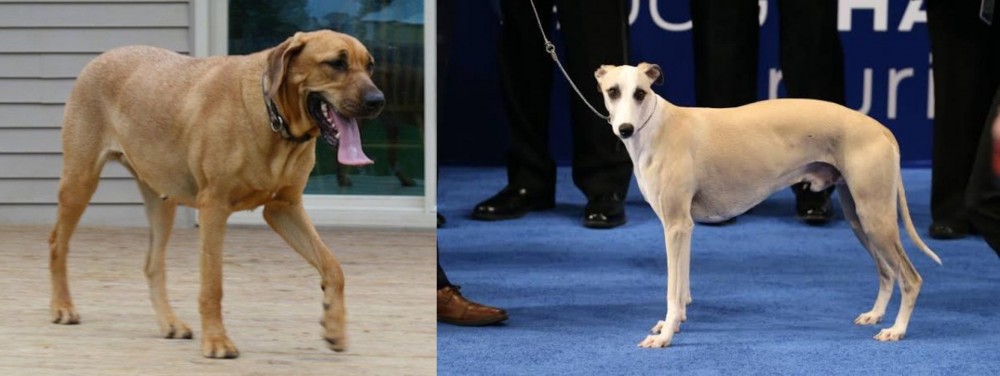 Danish Broholmer is originated from Denmark but Whippet is originated from United Kingdom. Danish Broholmer may grow 19 cm / 8 inches higher than Whippet. Danish Broholmer may weigh 47 kg / 104 pounds more than Whippet. Both Danish Broholmer and Whippet has almost same life span. Both Danish Broholmer and Whippet has same litter size. Danish Broholmer requires Moderate Maintenance. But Whippet requires Low Maintenance
Danish Broholmer is originated from Denmark but Whippet is originated from United Kingdom. Danish Broholmer may grow 19 cm / 8 inches higher than Whippet. Danish Broholmer may weigh 47 kg / 104 pounds more than Whippet. Both Danish Broholmer and Whippet has almost same life span. Both Danish Broholmer and Whippet has same litter size. Danish Broholmer requires Moderate Maintenance. But Whippet requires Low Maintenance
 The Danish Broholmer is also known as the Danish Mastiff. This is a large dog which comes from Denmark.
The Danish Broholmer is also known as the Danish Mastiff. This is a large dog which comes from Denmark.
Known as a molosser breed, the dog used to fulfill a guard dog role in the home of wealthy Danish people. There are those who take one look at the dog’s size and build, and regard him as aggressive, when in fact he is a calm, good-tempered dog.
The origin of this large dog breed goes way back to the Middle Ages, although details of the dog’s origins are unknown. The Broholmer comes from mixing the English Mastiff and various local German breeds, being named after the Sehested of Broholm.
The dog all but became extinct during the Second World War. It was in 1974 that the Danish Kennel Club started looking to revive the breed. The breed was revived and the dog was imported to the United Kingdom in 2009. The Danish Broholmer has been recognized by the United Kennel Club in 2006.
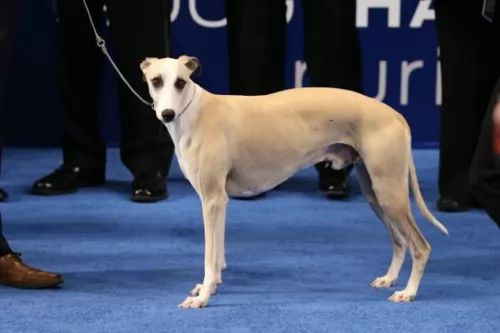 You can just see that Whippets are designed for speed with those super lean, slender bodies. They were developed by crossing Greyhounds with smaller terriers.
You can just see that Whippets are designed for speed with those super lean, slender bodies. They were developed by crossing Greyhounds with smaller terriers.
In open areas, they can pick up a high speed. In the 19th century in certain parts of England, they were used in races. They actually originated in England.
The Whippet is an ancient dog breed if you can go according to artwork which dates back to ancient Egyptian times.
They were also known as Snap dogs or small Greyhounds. You can say that the modern Whippet emerged in 1891. This was when the Kennel Club gave the breed official recognition. It was in 1888 that the dog was recognized by the American Kennel Club.
 The Danish Broholmer is a large dog that looks familiar to the Mastiff. The dog stands roughly between 66 and 75cm and weighs between 40 and 60kg.
The Danish Broholmer is a large dog that looks familiar to the Mastiff. The dog stands roughly between 66 and 75cm and weighs between 40 and 60kg.
The body is strong and muscular and he has the large head of the molosser. The coat of the dog is short and harsh, with the color being fawn, light brown, yellowish or black. He is quite a heavy shedder and will require brushing twice a week.
The dog usually has a black mask.The muzzle is also large, the nose black. His ears are medium-sized, set high and floppy, the chest deep. The tail is long and carried downwards.
The Danish Broholmer is an awesome family pet who seems to go out of his way to please his human family. He is an intelligent dog and obedient by nature. Because he is so devoted to his human family, he wants to protect them too.
He is a non-aggressive dog and the best part about owning such a dog is that he is a gentle pet for the family but he still looks threatening to intruders.
The Danish Broholmer gets on well with children and pets in the home. However such a big dog needs to be trained and socialized and he could jump up against smaller people and unintentionally send them flying. Training will see to it that he responds well do simple commands such as ‘down’, ‘sit’, lie-down’ and ‘come’.
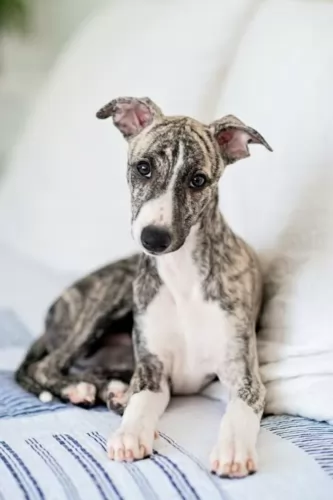 The Whippet is a medium-sized sighthound breed standing at between 45–56cm in height and weighing anything between 6 and 13kg.
The Whippet is a medium-sized sighthound breed standing at between 45–56cm in height and weighing anything between 6 and 13kg.
They descended from Greyhounds, resembling them in looks, just smaller. They are part of the Hound group, It’s a deep-chested dog with a long, lean head with fairy large eyes, a long neck, floppy ears and slim legs. The tail is long and slender. The coat is short and smooth and comes in many colors – tan, silver, black white, brindle and bi- or tri-colored.
The Whippet loves to run but when they’re not prancing around, they love spending time with their human family and that includes other pets as well as children.
They’re demonstrative and love showing their love for their family. They’re able to adapt to life in the city or the countryside but they will need exercising.
This is also a dog that rarely barks. They’re willful dogs so will do well with training and socialization. In fact, without proper socialization, they can become timid in unknown environments. They're intelligent so wont have problems with learning.
If you’re looking for a good watchdog and protector, you won’t find these characteristics in the Whippet.
 Once people have owned a Danish Broholmer, they have got nothing but good comments about them. You hear words such as courageous, sweet, good-natured, playful and intelligent. Also if he believes his family is in danger he will want to protect them.
Once people have owned a Danish Broholmer, they have got nothing but good comments about them. You hear words such as courageous, sweet, good-natured, playful and intelligent. Also if he believes his family is in danger he will want to protect them.
He is a great friend for child and adult and a fairly low maintenance breed too. He is an adaptable dog, but his size isn’t suited to small, cramped spaces. He will need to be exercised but this should be a pleasure as every human being can use some additional exercise themselves if they want to remain healthy.
Look after your wonderful amicable Danish Broholmer and he’ll shower you with his doggy love and devotion.
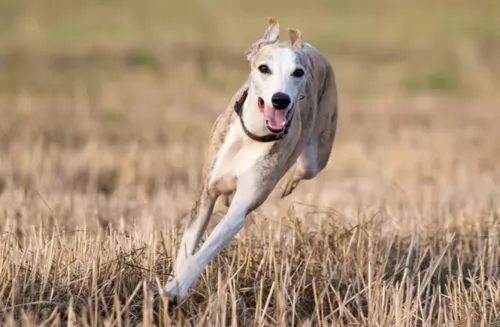 When you bring a sweet-natured Whippet into your life and home you’ll discover that apart from reveling in having a good run, their next favorite thing is to be resting quietly wherever their human companions are.
When you bring a sweet-natured Whippet into your life and home you’ll discover that apart from reveling in having a good run, their next favorite thing is to be resting quietly wherever their human companions are.
They’re docile dogs, loving to snuggle up to you, and not enjoying the cold. These quiet, gentle dogs are totally non- aggressive, just wanting to be with you, making you a splendid companion and pet.
 The Danish Broholmer is a large dog who can consume quite a lot of food. With large dogs like these, there is often strain on the dog’s joints.
The Danish Broholmer is a large dog who can consume quite a lot of food. With large dogs like these, there is often strain on the dog’s joints.
Also dogs with deep chests are also prone to gastric dilatation volvulus or bloat. In fact, large dogs can also suffer with obesity apart from joint problems. It is why they often live shorter lives than smaller dog breeds. Some points to consider with your large breed pet -
Nutrition is most important for puppies and your adult dog. Don’t overfeed your large breed puppy as he can grow too quickly so that his joints are at risk of injury.
Too much weight gain as well as too much exercise can increase the risk of your dog developing hip dysplasia. This is a hereditary disorder, causing problems with the hips. The disease can lead to terrible pain and sometime lameness. Always remember to keep the weight of your dog in a healthy range to prevent pressure on the joints.
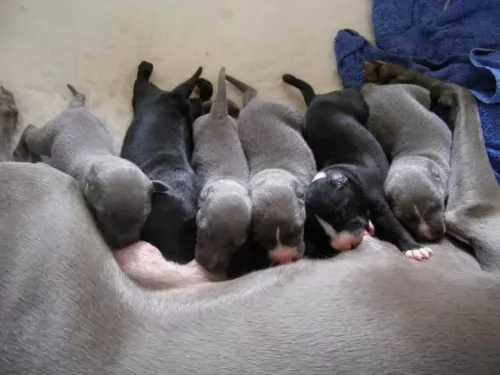 The lean Whippet doesn’t have any particular health problems but it is always a good idea to be clued up on some of the more common dog diseases there are.
The lean Whippet doesn’t have any particular health problems but it is always a good idea to be clued up on some of the more common dog diseases there are.
Buying a Whippet puppy from a responsible breeder will help with ensuring a healthier dog as dogs like these have had a good start and will have been vaccinated and dewormed.
This is when the heart of the dog beats too fast or too slow or it may even skip a beat. It is fairly common in dogs and it could indicate a more serious underlying condition.
An irregular heartbeat can bring about physical weakness and even loss of consciousness. Your veterinarian will want to examine your dog and listen to the history of symptoms and events that could have led to the condition. Your vet will then discuss treatment.
 For his size, you’d be inclined to think that the Danish Broholmer will require a lot of exercise, but in fact he is much like any other other. He will love to join you on your daily walks and will readily run to fetch a ball.
For his size, you’d be inclined to think that the Danish Broholmer will require a lot of exercise, but in fact he is much like any other other. He will love to join you on your daily walks and will readily run to fetch a ball.
Your Danish Broholmer will require quality food manufactured exclusively for large dog breeds.
There are excellent manufactured dog foods out there and you can take the kibble and mix in some home-made foods from time to time such as cooked brown rice, vegetables and chicken. He will also require some raw meat added into the diet occasionally.
Never leave him without a constant supply of cool, fresh water.
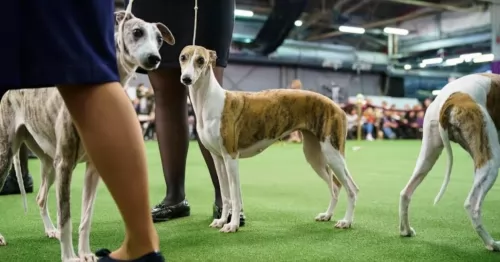 Whippets love running so if you’re lucky to live on a farm or at the beach, he will love those short bursts of speed in open places, chasing a ball. You can take him for a walk every day too.
Whippets love running so if you’re lucky to live on a farm or at the beach, he will love those short bursts of speed in open places, chasing a ball. You can take him for a walk every day too.
Whippets are looked upon as low maintenance dogs that don't shed much. A good brush twice a week will be adequate for this slender dog. The skin is vulnerable to cuts so check him over when you’re brushing him and make sure he hasn’t any sores or scrapes on the skin.
How much your adult dog eats depends on his size and his activity levels. Dogs are individuals and not all Whippets will eat the same amount of food. Puppies require 4 bowls of food a day while the adult Whippet will want 2 bowls of food.
There are excellent dry kibble dog foods on the market but your Whippet will also like some home-made food like chicken and vegetables. The quality of dog food you provide for your Whippet will make a huge difference to his health.